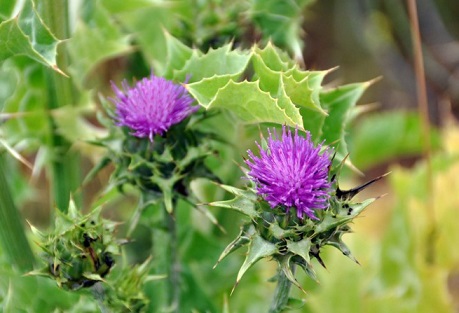Nikhil Prasad Fact checked by:Thiland Medical News Team Dec 27, 2024 3 months, 3 weeks, 3 days, 2 hours, 55 minutes ago
Medical News: In the quest for youthful and radiant skin, modern science continues to uncover natural alternatives to conventional skincare ingredients. One of the latest breakthroughs involves an extract derived from the seeds of the milk thistle plant, known scientifically as Silybum marianum. Researchers from Givaudan France SAS in Pomacle, France, and the Polyclinic of Courlancy in Reims, France, have demonstrated that this extract, referred to as SME (Silybum Marianum Extract), offers a safe and effective alternative to traditional retinoids like retinol. Their study highlights how SME can address skin aging without the adverse side effects associated with other treatments.
 French Study Uncovers Skin Antiaging Effects of Milk Thistle Extract
The Challenges of Retinoids and Their Alternatives
French Study Uncovers Skin Antiaging Effects of Milk Thistle Extract
The Challenges of Retinoids and Their Alternatives
Retinoids, derivatives of vitamin A, have long been a cornerstone in antiaging treatments. These compounds are known to stimulate collagen production, reduce fine lines, and improve skin texture. However, their effectiveness comes at a cost - many users experience redness, irritation, and increased sensitivity to sunlight. This
Medical News report explores a significant shift in skincare science as researchers seek alternatives that provide similar benefits without these drawbacks.
Bakuchiol, a plant-derived compound, emerged as a popular contender due to its gentler profile. However, studies have shown that while bakuchiol is less irritating, it falls short of matching the efficacy of retinol in certain aspects. Researchers have now turned to SME, a flavonolignan-rich extract from milk thistle seeds, as a potential solution.
The Science Behind SME
Milk thistle has been used in traditional herbal medicine for centuries, primarily for its liver-protective and antioxidant properties. The active compounds in SME, including silybin, silychristin, and silydianin, are known for their ability to neutralize oxidative stress and reduce inflammation. These characteristics make SME an appealing candidate for addressing skin aging, a process heavily influenced by environmental stressors like UV radiation and pollution.
To improve its effectiveness in skincare applications, SME was encapsulated in a lecithin-based formulation. This process enhanced its bioavailability and allowed the active ingredients to penetrate deeper into the skin. The researchers compared SME’s performance to retinol and bakuchiol through a combination of laboratory tests and clinical trials.
Key Findings of the Study
The study’s findings reveal several notable advantages of SME:
-Boosting Collagen Production: In both laboratory and clinical settings, SME demonstrated a significant increase in collagen III levels, often referred to as "youth collagen." Collagen III helps maintain the skin’s elasticity and firmness. Compared to bakuchiol and retinol, SME increased collagen III production by 23% and 16%, respectively. This enhancement paves the way for better skin plump
ing and structural support.
-Improved Skin Hydration: SME also showed remarkable efficacy in boosting hyaluronic acid (HA) levels, which are essential for skin hydration and elasticity. Compared to bakuchiol, SME increased HA production by an impressive 36% in laboratory tests.
-Wrinkle Reduction: In clinical trials involving 57 participants aged 45–73, SME reduced forehead wrinkle numbers by 21% and circumference by 17% after eight weeks of twice-daily application. These results were on par with retinol but significantly better than bakuchiol.
-Enhanced Tolerance: One of SME’s most compelling attributes is its superior safety profile. While 43% of participants reported discomfort, including redness and irritation, when using retinol, none experienced such side effects with SME. This aspect could address a critical barrier for consumers who discontinue retinol use due to adverse reactions.
Clinical Trial Insights
The clinical trial included four groups of volunteers who applied formulations containing SME, retinol, bakuchiol, or a placebo. Researchers utilized advanced imaging techniques like AEVA-HE and Visia CR2.3 to measure wrinkle depth, circumference, and skin redness. SME outperformed its competitors in several categories, showcasing its ability to reduce visible signs of aging while maintaining a high level of user comfort.
What Sets SME Apart?
SME’s unique action stems from its ability to work without binding to retinoic acid receptors (RARγ) in skin cells. Unlike retinol and bakuchiol, which partially activate these receptors, SME bypasses this mechanism, avoiding the associated side effects. Furthermore, SME’s potent antioxidant properties protect skin cells from reactive oxygen species (ROS), which accelerate aging. Laboratory tests confirmed that SME’s antioxidant effects were comparable to those of resveratrol, a well-known antioxidant compound.
The Road Ahead
While the study highlights the promise of SME, the researchers acknowledge certain limitations. The clinical trial’s sample size, though comparable to similar studies, could be expanded for more robust conclusions. Additionally, further research is needed to explore SME’s long-term effects and potential applications in other skincare formulations.
Conclusion: A Game-Changer in Skin Antiaging
The introduction of SME as a safe and effective alternative to retinoids represents a significant advancement in the field of cosmetic dermatology. By enhancing collagen III and hyaluronic acid levels without triggering irritation, SME addresses the dual goals of efficacy and user comfort. This innovation could revolutionize the skincare industry, offering consumers a natural and reliable solution to combat the visible signs of aging.
For those seeking a balance between performance and safety in their skincare routine, SME presents a promising option. As consumer demand for natural and sustainable products continues to grow, innovations like SME underscore the importance of harnessing the power of nature in scientific advancements.
The study findings were published in the peer-reviewed journal: Journal of Cosmetic Dermatology.
https://onlinelibrary.wiley.com/doi/10.1111/jocd.16613
For the latest Antiaging News, keep on logging to Thailand
Medical News.
Read Also:
https://www.thailandmedical.news/news/quercitrin-from-green-ball-apples-and-its-protective-role-against-skin-aging
https://www.thailandmedical.news/news/breaking-murine-study-reveals-anti-aging-power-of-poly-l-lactic-acid-microspheres-for-skin-rejuvenation
https://www.thailandmedical.news/articles/aesthetics
https://www.thailandmedical.news/articles/anti-aging
